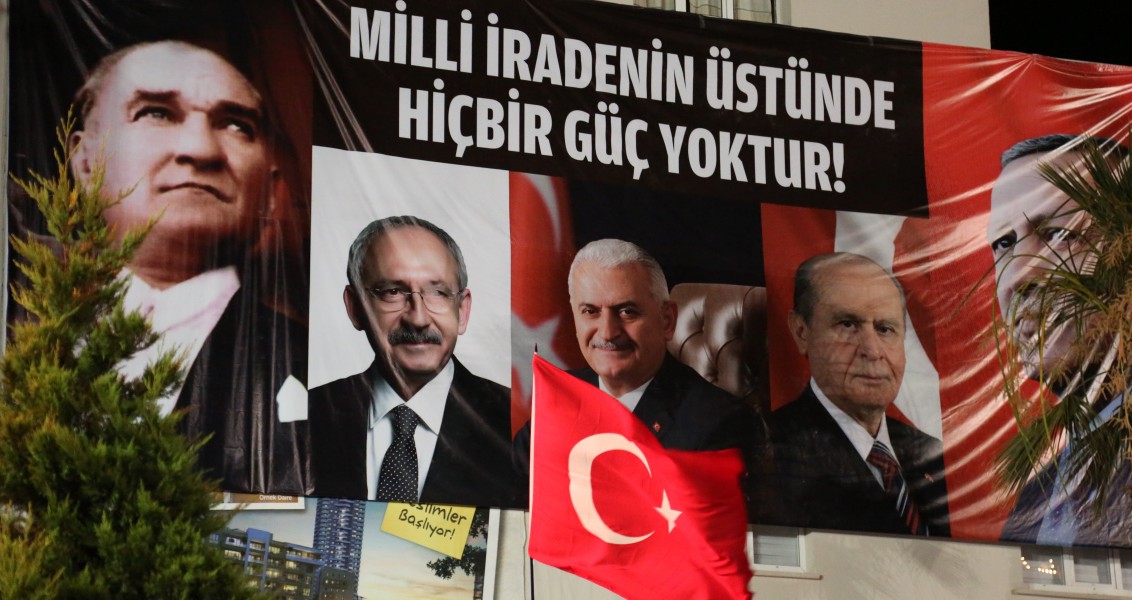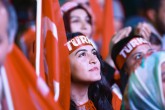The July 15 coup attempt brought with it staggering changes to Turkey’s socio-political reality. As the days go by, more details have been coming out and the extent of the danger Turkey was in becomes clearer with each new clarification.
This bloody coup attempt, led by Fehtullah Gülen, was obstructed through the political leadership of President Recep Tayyip Erdoğan, the media’s anti-coup broadcasts, law enforcement’s resistance and of course with the people running to the streets and standing against the tanks. Ever since the night of July 15, people have been keeping “democracy watch” throughout Turkey. Ever since the July 15 coup attempt, lights have not been dimmed and the squares are not empty. People in the streets are waiting on President Erdoğan’s call to return home in order to go back to their homes at night.
What changed in Turkey’s socio-political reality after the unsuccessful coup attempt on July 15? Above all else, be it in the political or in the societal sphere, an intense environment of interaction and dialogue appeared between various actors. Those who analyze Turkey’s politics had constantly repeated the issue of political polarization and even societal polarization over the past few years. During that period, I had insistently said that while we might be able to speak of political polarization in Turkey, it was not possible to speak of societal polarization. And the July 15 coup attempt clearly shows this, with society as a whole objecting and preventing the coup from succeeding.
After this show of force on the part of society, a new environment of interaction also appeared in the political arena as well. Opposition party leaders all spoke out against the coup attempt and responded positively to Erdoğan’s call. Afterward, Parliament met in an emergency session and the four parties in Parliament signed a joint declaration. This is something that had not happened in Turkey’s recent political history.
What is more, the ruling Justice and Development Party (AK Party), the main opposition Republican People’s Party (CHP) and the far-right opposition Nationalist Movement Party (MHP) were invited to the Presidential Palace in Beştepe. The photo of Erdoğan, Prime Minister Binali Yıldırım, CHP Chairman Kemal Kılıçdaroğlu and MHP Chairman Devlet Bahçeli at the meeting showed an important point had been surpassed in Turkey’s politics. As those who closely follow Turkey’s politics will know, opposition parties conducted election campaigns in the last four elections based on their opposition to Erdoğan, and especially in the last two in which they slammed the construction and scope of the Presidential Palace.
In the aftermath of July 15, we can see that an environment of peace, normalization and dialogue has appeared in Turkey’s politics. In this period, no matter the fact that it maintains a presence in the Western world, the baseless and irrational enmity toward Erdoğan has shrunk to a great extent in Turkey’s politics. Turkey’s people believe that this coup attempt was able to be surpassed through Erdoğan’s leadership is highly effective in the appearance of this situation. The general understanding among the people is that be it Erdoğan’s attitude on the night of the coup attempt or the struggle he has been leading against Gülen’s illegal organization for the past years, they have contributed to the defeat of the coup.
Another factor that appeared after July 15 is the positive politicization of the people. We saw a large part of society participating in politics not just with votes at the ballot box but by actively going out into the streets to protect their vote. This politicization, which occurred in an incomparably limited manner during the Gezi Park protests were constantly mentioned in the headlines in Western media. Today, unfortunately, this matter has not drawn the attention of the Western world.
Another factor that has appeared in Turkey’s socio-political reality after July 15 is the increase in the capacity in politics, the bureaucracy, civil society, media and economics. Despite the immense trauma that occurred and the bloody coup attempt by the Gülenist junta, no languishing occurred in the economy, the way for a political solution to Turkey’s structural problems was paved, civil society organizations demonstrated a concentrated effort for the rehabilitation of society, the media embarked on a quest to truly inform the Western world after it left Turkey on its own with its problems and the bureaucracy has expended efforts to resolve the havoc that has been wreaked and to adapt to the new period to become more functional.
All of these are the side effects of the failed coup attempt. For those who wanted the coup to succeed, none of these are positive. It is exactly because of this that Turkey’s image in the Western media is unfortunately manipulated, with reality. I am not speaking of manipulation, but of presenting an image of Turkey based on false news garnered from lies.
And what if the coup had succeeded? Yes, if the coup had succeeded, Turkey’s society would have been faced with heavy losses; the leading representatives in politics, media and civil society would have been executed; the chaos in the Middle East would have deepened and Turkey would have become the main focus of global disintegration in the 21st century.
Is this what you want? If so, are you sure?
[Daily Sabah, July 29, 2016]
In this article
- Domestic Policy
- Opinion
- 2016
- Daily Sabah
- Elections
- Far-Right
- Global Actors | Local Actors
- Istanbul
- May 28-August 20 2013 The Gezi Park Protests
- Middle East
- Normalization
- Opposition
- Prime Minister
- Recep Tayyip Erdoğan
- taksim
- The President of the Republic of Türkiye
- Turkish President
- Türkiye's Justice and Development Party | AK Party (AK Parti)
- Türkiye's Republican People's Party (CHP)
- Türkiye's Republican People’s Party (CHP) Chairperson
- Türkiye’s Nationalist Movement Party (MHP)
- Western Media
- Western World



